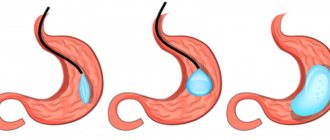What is excess weight
Excess body weight is formed due to the deposition of excess fat reserves, provoked by various factors. They not only violate the aesthetic picture, but also cause the development of pathologies of internal organs.
When considering the concept of excess weight, one cannot fail to mention the body mass index. It is the ratio of body weight, expressed in kilograms, to height in meters squared: kg/m². If this indicator is between 25–30, they are said to be overweight.
If its value goes beyond 30, this indicates obesity. It is divided into two types:
- central, when excess fat is concentrated in the abdominal area. This type is considered the most dangerous, since it is it that provokes the occurrence of diseases of the internal organs;
- pathological, develops as a result of endocrine disorders.
We should talk about obesity when the waist size in women is more than 82 cm, and in men - over 102 cm.
Depending on the amount of extra kilos, four degrees of the disease are distinguished:
- I degree – excess weight is more than 29%;
- II degree – from 30 to 49%;
- III degree – from 55 to 99%;
- IV degree – more than 100% of normal body weight.
John Minnock is recognized as one of the greatest people in history. Its maximum weight reached 635 kg. Naturally, the guy could not move on his own, and it took about 10 people to turn him over to the other side. Consequences: At the age of 37, John was hospitalized with heart failure.
It should be said that obesity has a detrimental effect on the entire body. Excess fat mass puts additional stress on the heart, resulting in hypertension, heart attack or stroke.
The musculoskeletal system also suffers greatly. Unable to withstand the additional load, hernias appear in the spinal column, and inflammation and deformation accompany the joints.
There is no need to talk about the digestive system. Cholecystitis, pancreatitis, cholelithiasis, gastritis, liver failure - all this tirelessly accompanies such people.
Obesity causes persistent metabolic disorders, which increases the risk of developing diabetes, and also provokes sexual problems. Death is usually a consequence of cardiopulmonary failure.
The effect of excess weight on reproductive function
Excess weight provokes hormonal imbalance.
In the adipose tissue of the female body, male hormones androgens are converted into female hormones - estrogens. When it is in excess, the amount of estrogen exceeds the norm. As a result, an imbalance is formed, which manifests itself in the form of various problems, one of them is related to childbirth and problems at the conception stage. The more excess weight you have, the higher the risk of difficulty conceiving.
Excess weight, especially excess abdominal fat, is associated with insulin resistance (when the body has to produce more insulin to keep blood sugar at normal levels) and decreased levels of sex hormone binding globulin, a protein that is involved in regulating the sex hormones androgens and estrogens. This increases the risk of irregular menstrual cycles, which in turn reduces fertility.
Changes in hormonal balance due to obesity also increase the risk of anovulation. This menstrual cycle disorder is characterized by the absence of ovulation. Many overweight women still ovulate, but the egg quality is significantly lower than in women of normal weight.
With IVF, the likelihood of a normal course and completion of pregnancy in women with overweight or obesity is lower than in women with a normal BMI. On average, the likelihood of having a healthy baby with IVF is reduced by 9% in overweight women and by 20% in obese women.
Where do the extra kilos come from?
There may be several reasons for weight gain. But still, the most common of them is overeating and a passive lifestyle.
The accumulation of fatty deposits occurs due to an imbalance between calories entering the body and wasted energy. In other words, the abuse of high-calorie foods, favorite sweets and flour products can easily provoke the appearance of extra pounds if the incoming calories are not burned in a timely manner.
For example, Michael Hebranco, whose weight at the age of 16 was already 160 kg, claimed that at breakfast he ate 12 eggs and a whole loaf of fried bread with jam. Moreover, this was only a warm-up, and real food followed. The guy claimed that he had a real addiction to food, like drug addiction or alcoholism. Its maximum weight was 500 kg. At this time, he consumed about 13 thousand calories per day.
Often, extra pounds are added as a result of disorganization of the daily routine. For example, a person returns late from work. During the working day, he would break in with snacks, and when he came home, he would have a full meal, but, as a rule, this happens at 9 or 10 o’clock in the evening. Calories come in and remain unutilized. An active lifestyle and sports training would help burn them. But unfortunately, not everyone manages to comply with this regime. Sedentary work, lack of time and simply laziness get in the way of a healthy life.
Banal overeating also almost always has its own reason. And, above all, these are stressful situations, strong shocks that a person seeks to eat. Thus, it has been established that victims of sexual violence subconsciously strive to eat more in order to hide their sexuality from prying eyes and no longer attract attention.
A person also tends to “eat up” his need for security, sensing a potential threat, or mistakes another emotion for hunger: excitement or disappointment. An individual, and more often a woman, cannot correctly interpret the feeling, experiences anxiety, but cannot connect it with anything.
Hereditary predisposition adds fuel to the fire if someone in the family suffers from excess weight.
On the other hand, obesity is caused by some internal disease. And in this case, obesity is secondary.
Endocrine disorders often provoke weight gain. First of all, this is hypothyroidism - decreased function of the thyroid gland and diabetes mellitus, as well as Itsenko-Cushing's disease, manifested by adrenal dysfunction. Other pathological conditions include: impaired enzyme activity, genetic diseases, pathologies of the heart and kidneys. Thus, the already familiar John Minnock, who was admitted to the hospital with heart failure and weighing 635 kg, had about 400 kg of his weight in fluid. It accumulated as a result of edema caused by cardiac dysfunction.
It has been established that certain groups of drugs also contribute to weight gain. These are glucocorticoids, hormone-based contraceptives, and psychotropic drugs.
Keep your food choices and calories under control
Exercise is great for your figure, but you won't lose one size without eating well. Find out how many calories you need to eat per day to maintain your current weight and subtract 500 from that number. If you reduce more, you will only run out of steam ahead of time, putting yourself at risk of overeating from hunger, which will take you even further from your goal. A truly effective way to find out how many calories your body burns and how many it needs to gain/maintain/lose weight is the latest special weight management devices. However, even without this, you can find out the approximate number that you should rely on (more details in the article How many calories should you consume per day? How many calories do you need to lose weight?, and also here - Calories. Their functions. Why more calories are better than fewer. Why you may need more calories to lose weight).
And here's some food for thought—not all calories are created equal. A handful of 100 calorie chips is not equal in value to a fruit of the same calorie content. Try to eat healthy foods that are good for your body, and you may soon find that you have reached a level of thinking where losing weight is not the daunting challenge you once thought it was.
Relieving excess weight using non-drug methods
First of all, a person aimed at losing weight should adjust his diet :
- reduce calorie intake;
- fill the diet with vegetables and fruits, cereals, and protein. Exclude baked goods, fatty, smoked, salty foods;
- between main meals, have snacks, but only with permitted foods;
- drink more water – up to 2 liters per day. It promotes the breakdown of fats;
- Arrange fasting days 1–2 times a week: vegetable, fruit, kefir days;
- Monitor your weight daily using scales. Do not allow the values to increase by more than 3 kg. It’s also worth remembering that the weight may not start to come off right away, but don’t get upset, you just need to be patient.
But these are only general provisions. You can use them on your own if you want to get rid of a few extra pounds.
In case of obesity, when excess kilograms can reach 20, 30, it is better to consult a specialist, and specifically a nutritionist . The doctor will help you choose an individual diet, taking into account the condition of your body, and will develop a daily diet plan that will allow you to lose weight safely.
A nutritionist is a specialist in the field of nutrition who has information about each food element. He knows about the benefits and harms of a particular product, its calorie content, and the amount required for the body. The main thing is that the specialist has information on how to correctly combine products so that they bring maximum benefit to the body and enrich it with vitamins and minerals. He will create a diet taking into account the required caloric intake and select the optimal ratio of proteins, fats and carbohydrates.
In addition, it is worth understanding that if a person suffers from obesity, physical activity is initially contraindicated , otherwise the joints will be subjected to excessive pressure. Only after getting rid of a certain amount of kilos can you start training. In this case, it is better if the process is supervised by a specialist - a personal trainer. It will distribute the load without risk to health. Thus, by combining proper nutrition and dosed training, the process will move forward. And a positive result will definitely come.
An important stage in the treatment of obesity is psychotherapy . It helps to develop correct eating habits, teaches self-control skills, and changes the patient’s attitude towards food. Reveals to him the true reasons for food abuse.
If the reason for weight gain lies in external conflicts with the patient’s environment, psychotherapy will help to form new principles of relationships with society.
Psychotherapeutic treatment is especially important in cases of psychogenic overeating.
Tip 3. Eat more vegetables
Ideally, every meal should include a portion of fruits or greens. Raw, stewed or boiled vegetables regulate appetite, gastrointestinal motility, and help bind and remove excess fat from the intestines. They are low in calories and require virtually no restrictions. For people with increased appetite, vegetable snacks will ensure slimness without overeating, brutal hunger and bad mood. The main thing is to be patient.
Real weight loss results for obese people on proper nutrition should be expected not in a week, but in 1.5–2 months.
Medicines for weight loss
With the problem of excess weight, it is better to contact a nutritionist or endocrinologist. First of all, the specialist will order an examination to determine the true cause of weight gain:
- thyroid hormones;
- blood glucose;
- glycated hemoglobin;
- level of lipid components, etc.;
- the level of leptin – the satiety hormone.
After the examination, the doctor develops treatment tactics. In certain cases, it may include medications. If there is an underlying disease, it is treated with specific drugs.
But there are special means aimed at reducing body weight:
- to suppress appetite;
- to reduce fat absorption;
- affecting carbohydrate metabolism;
- affecting the saturation center in the brain.
It is not recommended to use such drugs on their own, as they have a wide range of side effects. Many of them are prohibited from official sale. There is a narrow list of such medications that are approved by the US Food and Drug Administration.










